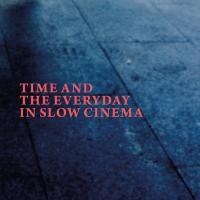Book Section
| Part of Time and the Everyday in Slow Cinema Containing: |
|---|
| Introduction |
| A Slow Revolution? |
| Time |
| The Everyday |
| The Politics of Cinematic Time |
| Conclusion |
| Title |
Introduction
|
| Author(s) |
Rosa Barotsi
|
| Identifier | |
| Is Part Of | |
| Place |
Berlin
|
| Publisher |
ICI Berlin Press
|
| Date |
8 July 2025
|
| Rights |
© by the author(s)
This work is licensed under a Creative Commons Attribution-ShareAlike 4.0 International License.
|
| Language |
en-GB
|
| page start |
1
|
| page end |
8
|
| Source |
Rosa Barotsi, Time and the Everyday in Slow Cinema, Cultural Inquiry, 34 (Berlin: ICI Berlin Press, 2025), pp. 1–8
|
- Barotsi, Rosa, ‘Contemporary European Cinema, Time, and the Everyday’ (unpublished doctoral thesis, University of Cambridge, 2013)
- Betz, Mark, ‘Beyond Europe: On Parametric Transcendence’, in Global Art Cinema: New Theories and Histories, ed. by Rosalind Galt and Karl Schoonover (New York: Oxford University Press, 2010), pp. 31–47
- Bordwell, David, ‘Parametric Narration’, in Narration in the Fiction Film (Madison: University of Wisconsin Press, 1985), pp. 274–310
- De Luca, Tiago, ‘Realism of the Senses: A Tendency in Contemporary World Cinema’ (unpublished doctoral thesis, University of Leeds, 2011)
- De Luca, Tiago, ‘Realism of the Senses: A Tendency in Contemporary World Cinema’, in Theorizing World Cinema, ed. by Lúcia Nagib, Christopher Perriam, and Rajinder Kumar Dudrah (London: I.B. Tauris, 2012), pp. 183–205 <https://doi.org/10.5040/9780755698141.ch-011>
- Finn, Howard, Cinematic Modernism and Contemporary Film: Aesthetics and Narrative in the International Art Film (London: Bloomsbury Academic, 2023) <https://doi.org/10.5040/9781350242593>
- Flanagan, Matthew, ‘Towards an Aesthetic of Slow in Contemporary Cinema’, 16:9, 6.29 (2008) <http://www.16-9.dk/2008-11/side11_inenglish.htm> [accessed 10 October 2024]
- Flanagan, Matthew, ‘“Slow Cinema”: Temporality and Style in Contemporary Art and Experimental Film’ (unpublished doctoral thesis, University of Exeter, 2012)
- Gronstad, Asbjorn, Film and the Ethical Imagination (London: Springer, 2016) <https://doi.org/10.1057/978-1-137-58374-1>
- James, Nick, ‘Being Boring’, Sight & Sound, 20.7 (2010)
- James, Nick, ‘Passive Aggressive’, Sight & Sound, 20.4 (2010)
- Mai, Nadin, The Arts of (Slow) Cinema <https://theartsofslowcinema.com/bibliography/> [accessed 11 October 2024]
- Martin, Adrian, ‘Slow Defence’, Filmkrant, 5 September 2011 <https://filmkrant.nl/rubriek/world-wide-angle-nl-5-september-2011/> [accessed 28 July 2024]
- McMahon, Laura, Animal Worlds: Film, Philosophy and Time (Edinburgh: Edinburgh University Press, 2019) <https://doi.org/10.3366/edinburgh/9781474446389.001.0001>
- Orban, Clara, Slow Places in Béla Tarr’s Films: The Intersection of Geography, Ecology and Slow Cinema (Lanham, MA: Rowman & Littlefield, 2021) <https://doi.org/10.5040/9781978726857>
- Schoonover, Karl, ‘Wastrels of Time: Slow Cinema’s Laboring Body, the Political Spectator, and the Queer’, Framework, 53.1 (2012), pp. 65–78 <https://doi.org/10.1353/frm.2012.0007>
- Shaviro, Steven, ‘Slow Cinema vs Fast Films’, The Pinocchio Theory, 12 May 2010 <http://www.shaviro.com/Blog/?p=891> [accessed 28 July 2024]
- Tuttle, Harry, Unspoken Cinema: Contemporary Contemplative Cinema <http://unspokencinema.blogspot.co.uk/> [accessed 10 October 2024]
- Walsh, Michael, Durational Cinema: A Short History of Long Films (Berlin: Springer Nature, 2022) <https://doi.org/10.1007/978-3-030-76092-2>
- Çağlayan, Emre, Poetics of Slow Cinema: Nostalgia, Absurdism, Boredom (London: Springer, 2018) <https://doi.org/10.1007/978-3-319-96872-8>
- Benning, James, dir., Rurh (2009)
- Lockhart, Sharon, dir., Double Tide (2009)

